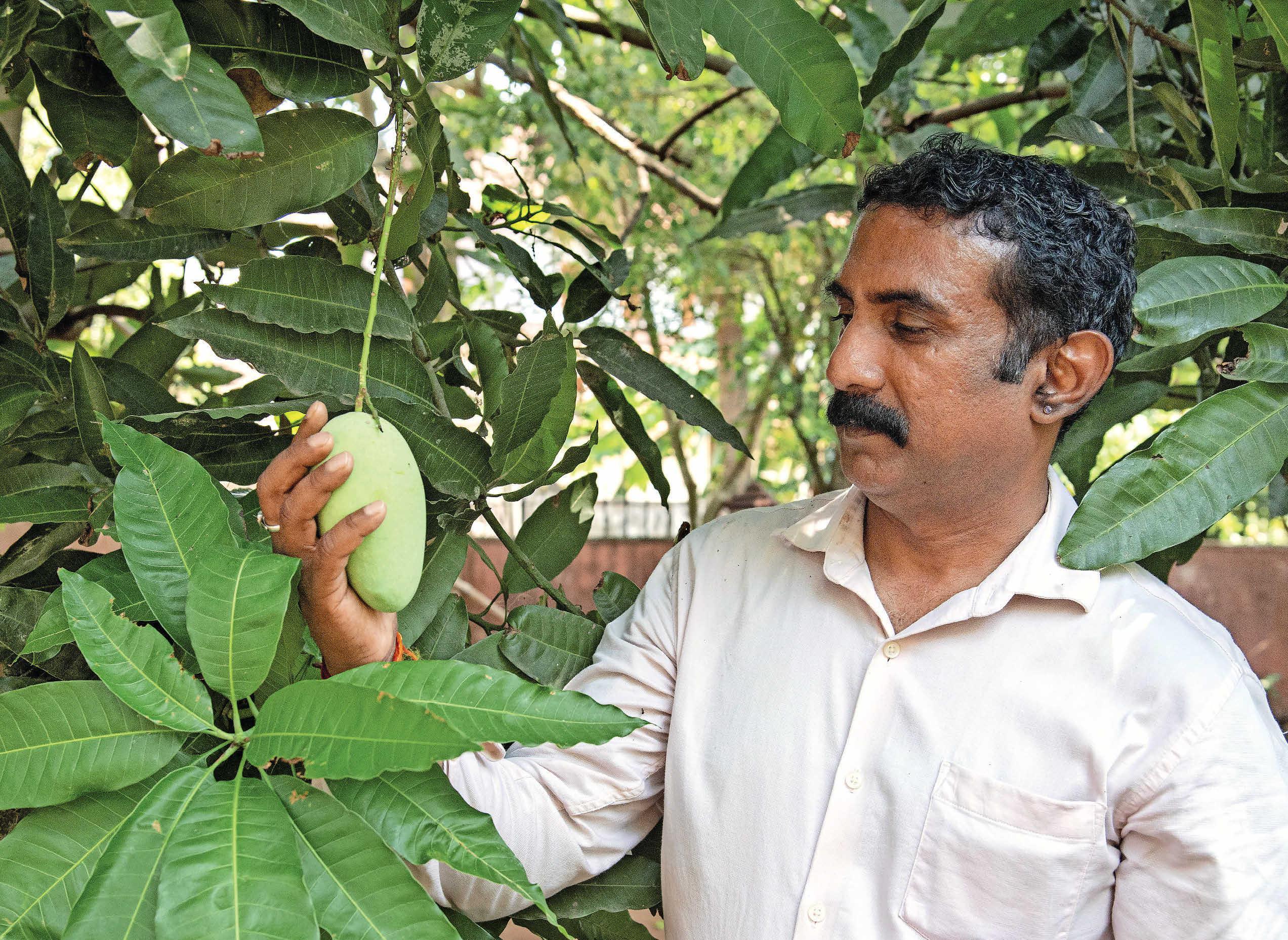Prøve GULL - Gratis
THE MANGO HUNTERS
THE WEEK India
|May 26, 2024
'Naadan Maavukal' started out as a Facebook group, but what it does offline has helped conserve many indigenous varieties of mangoes

The summer of 2020 was not a kind one. It was a scorching April afternoon when Sakhil Thaiyyil and friends reached Ottapalam in Palakkad, Kerala. As the road made a sharp turn, he noticed a gated house partly under the shade of a mango tree. The group stopped. On the other side of the gate, the woman of the house grew suspicious of the strangers staring at her property. When Thaiyyil asked her how good were the mangoes, she said, “Useless.”
The lady’s reaction did not surprise him, having had several such encounters. He did what he has always done—picked up a mango, half-eaten by a bird, from the ground and took a bite of its unbitten side. And, he was in sweet heaven. “Were you talking about this same tree, chechi (sister)?” he asked the woman. The fruit was fleshy with little fibre. The woman sheepishly replied that she was sleepy and was caught off guard by the group of strangers who wanted to know about a mango tree. When asked if the tree had a name, she was baffled. Who names trees in their compound? Thaiyyil spotted the name of her child scribbled on the steps leading to the house’s main door. “Shall we call it ‘Kunjoos’, then?” he asked. The family agreed.
Apart from ‘Kunjoos’, there is ‘Anaswara’, ‘Arya’, ‘Kairali’, ‘Thrissurkaaran’ and more. Most mangoes ‘found’ by Thaiyyil’s group are named with some reference to their discovery. “Mostly, it is nicknames of children. Obviously, you cannot give sweet mangoes adult names like Babu, Sabu,” he said, laughing.
Denne historien er fra May 26, 2024-utgaven av THE WEEK India.
Abonner på Magzter GOLD for å få tilgang til tusenvis av kuraterte premiumhistorier og over 9000 magasiner og aviser.
Allerede abonnent? Logg på
FLERE HISTORIER FRA THE WEEK India

THE WEEK India
Embracing change in retirement
It was August 4 when the aircraft touched down in Bengaluru. My wife Rajitha and I had left behind the fiery noon of Gurugram for Bengaluru's more temperate weather. Waiting for us outside was a warm embrace from the Nestle family in Bengaluru. About half a dozen of my former colleagues from Nestle were there to welcome us with the traditional headgear and beautiful flowers!
2 mins
August 31, 2025

THE WEEK India
Eyes on the skies
How the world is preparing to handle asteroid threats
4 mins
August 31, 2025

THE WEEK India
TERMINAL VELOCITY
A MEGA AIRPORT IN NOIDA IS SET TO TRANSFORM UTTAR PRADESH’S FORTUNES AND REDRAW INDIA’S AVIATION MAP
7 mins
August 31, 2025

THE WEEK India
MUMBAI'S NEW GATEWAY
India's financial capital is ready for a twin-airport future
4 mins
August 31, 2025

THE WEEK India
The stylish maestro
Quick: Who is the most applauded young sitarist on the global music circuit right now? Arguably, it is Rishab Rikhiram Sharma, 26, the first solo Indian classical musician invited to perform at the Bidens' famous Diwali White House party in 2022. His backstory is as compelling as his music. Even more so, considering India's current strained ties with Donald Trump, the present occupant of the White House.
2 mins
August 31, 2025

THE WEEK India
WORLD OF OPPORTUNITIES
GLOBAL MARKETS ARE OPENING UP TO INDIAN INVESTORS THROUGH GIFT CITY
4 mins
August 31, 2025

THE WEEK India
Shared values, common future
Strengthening international security, ensuring food and energy security and safeguarding freedom of navigation fully align with India’s core interests. India will advance these goals if it uses its considerable influence on Moscow to stop the war
5 mins
August 31, 2025

THE WEEK India
My 15 minutes of fame
It is kind of fashionable these days to assert that this thing or that thing has not been done in the past 70 years. In keeping with this trend, I hereby declare that never in the past 70 years had I been asked by anyone to hoist the national flag at any function.
3 mins
August 31, 2025

THE WEEK India
India will be favourites for the next five Olympiads
ON AUGUST 10, R. Praggnanandhaa left the teens to turn 20. Ten days prior, there was an early birthday gift— FIDE published its August ratings, and Praggnanandhaa was World No. 4, the highest-rated Indian ahead of World Champion Gukesh D. and Arjun Erigaisi.
4 mins
August 31, 2025

THE WEEK India
Petition to power
By launching a signature campaign for statehood, Omar Abdullah takes a gamble—to convert public disillusionment into political leverage
3 mins
August 31, 2025
Listen
Translate
Change font size

